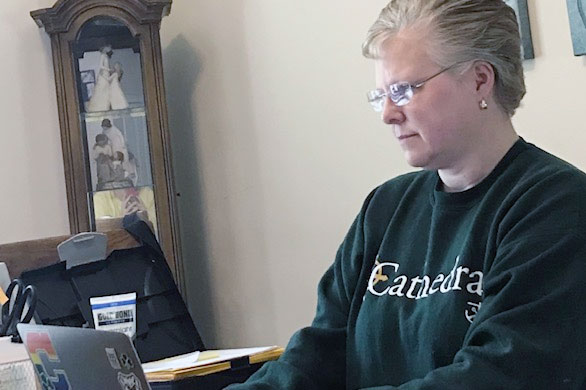In the midst of Covid-19, seniors apply for college
Pivonka offers tips and debunks myths for the Class of 2021

Couselor Mrs. Kathy Pivonka said families should be aware of upcoming college admissions deadlines.
2020 is a bit different. Said everyone ever.
The “uncertain times,” as they are called, that are all too familiar have extended into a portion of high school seniors’ lives that were already a bit nebulous to begin with: college applications and the admissions process.
The members of the Class of 2020 were the first ones to feel the effects Counselor Ms. Kathy Pivonka said, “When we went home last March, the first thought for me was that seniors are trying to pick their colleges.” Although quite a few former seniors had all but finalized their decisions, many had planned to visit schools farther away during spring break.
Other students had to reevaluate and decide whether they wanted to still attend an institution hundreds of miles away for the same five-figure price of a digitized education.
Pivonka said counselors were right in the middle of meetings with juniors and that all conferences scheduled after March 12 had to be moved to Google Meets. Pivonka said that typically counselors will have multiple contacts with juniors, but this year counselors have had to wait to reconnect with their students in the fall.
Overall, Pivonka said that the Class of 2021 had to regroup. Typically, the incoming seniors will attend a common app workshop in August just before school starts as well as tour colleges and take standardized tests.
“I think the biggest piece is scores,” said Pivonka. The absence and repeated cancellations of standardized testing are create perhaps the most significant impact on the application process. Between the ACT and SAT, eight testing dates were canceled all across the country.
As a result, a vast majority of colleges and universities have adopted a test-optional, test-blind or even test-flexible policy. From the counseling perspective, this has added a new layer of questions and decision-making. Pivonka said, “There is no right answer.” For instance, a strong student who has test anxiety may not want to submit their score to some schools, or another student may withhold their scores in order to make themselves a more competitive applicant.
In some cases, scholarships may not be test-optional and Pivonka said students should read very carefully on their target school’s website, as well as checking where they are compared to the school’s 50th percentile.
Typically colleges will have a higher amount of applicants by this time. Behind the scenes in college admissions, Pivonka said her contacts told her “the numbers are down.” Pivonka said, “Everything seems to be a bit behind with the application process.” Smaller colleges may be more receptive to students applying early, but larger or more competitive schools are unlikely to admit more than usual.
A common worry among seniors and their parents is that there will be fewer spots for the Class of 2021 because members of the Class of 2020 deferred their spot. However, Pivonka said “Deferral requests were not actually as high as some thought.”
In spite of the dark clouds of COVID, “there is a silver lining in the pandemic,” said Pivonka. Aside from test-optional policies enabling some shaky testers, students have also been blessed with a myriad of virtual tours, recorded webinars and Zoom breakout rooms with professors and current students.
Pivonka said that the trending topics page on the counseling website has links to many of these programs. Younger grades are able to view much of this material as well, without the pressure to actually apply. “The real deal is the best, but these are good,” said Pivonka.
But perhaps the biggest adaption this year is the need to destress.
Pivonka said, “All seniors are stressed but the unknowns are massive this year and the stress has increased a ton.” But the Class of 2021 isn’t alone. The counseling department has, of course, never encountered anything on this level, either. “Our biggest job, aside from advocating for you and processing paperwork, is thinking through the right fit and keeping you calm,” said Pivonka.
One tool for both students and counselors has been a checklist Pivonka put together last year and is now being used in meetings this year. “You could see the stress melt off their face. Not all the way,” she said. “But it was helpful.”
While students are waiting for their college meetings or contemplating their next box to tick on the counseling department’s checklist, they can check out the scattergrams on Naviance, the common data set or even email admissions officers at their target schools about testing policies. Pivonka said that she fully expects students to walk into her office. “Maybe even the same one five times,” she said. Information is the only remedy for this level of stress.
“The worse thing you can do is to not ask questions,” said Pivonka.

Andrew de las Alas is a senior and reporter for the Megaphone. He runs varsity cross-country, is co-captain of the speech and debate team and co-president...






